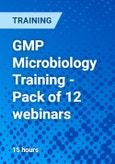This exclusive Pack contains 12 courses:
1. ISO/IEC 17025 Update - The Latest Standard for Laboratory Competence
2. Objectionable Microorganisms in Biopharmaceutical Production - Identification and Risk Mitigation
3. Quality Control for Analytical Materials used in Microbiology Laboratories
4. Steam Sterilization Microbiology and Autoclave Performance Qualification
5. Is it Microbiological Method Verification or Validation, or Just Semantics?
6. Environmental Monitoring Investigation Techniques for Effective Contamination Control
7. Root Cause Analysis (RCA) in the Laboratory - Addressing Non-Conformances
8. Regulatory and Testing Requirements of the Bacterial Endotoxin Testing (BET) or LAL Program
9. Aseptic Process Overview and Validation
10. Ensuring Integrity and Security of Laboratory Data for FDA / EU Compliance
11. Handling OOS Test Results and Completing Robust Investigations
12. Analytical Microbiology - Contract Lab vs In-House Lab - How to Overcome the Corporate Dilemma
Course Content
TOPIC 1: ISO/IEC 17025 Update - The Latest Standard for Laboratory Competence
Speakers
- Carl Patterson
- Danielle DeLucy
- Dr. Ludwig Huber
- Kelly Thomas
- Michael Brodsky








